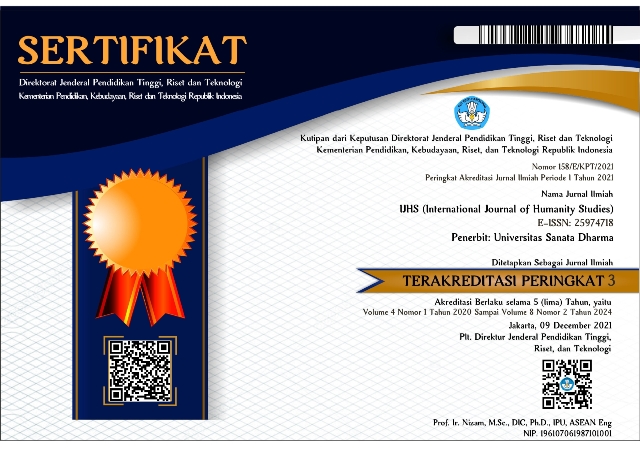IMPOLITENESS STRATEGIES BASED ON CULPEPER’S MODEL: A DISCOURSE ANALYSIS OF A MAN CALLED OTTO
(1) Universitas Bina Sarana Informatika, Indonesia
(2) Universitas Bina Sarana Informatika, Indonesia
(*) Corresponding Author
Abstract
Keywords
Full Text:
PDFReferences
Arendholz, J. (2013). (In)appropriate online behavior: A pragmatic analysis of message board relations (Vol. 229). John Benjamins Publishing Company.
Bączkowska, A. (2017). Impoliteness in media discourse (A. Bączkowska, Ed.; Vol. 5). Peter Lang Edition.
Brown, P., & Levinson, S. C. (1987). Politeness: Some universals in language usage. Cambridge University Press.
Capone, A., & Mey, J. L. (2016). Interdisciplinary studies in pragmatics, culture and society (A. Capone & J. L. Mey, Eds.). Springer International Publishing. http://www.springer.com/series/11797
Chintiabela, G. (2017). A pragmatic analysis of impoliteness strategies in Carrie movie. https://journal.student.uny.ac.id/quill/article/view/6373
Creswell, J. W., & Creswell, J. D. (2018). Research design: Qualitative, quantitative, and mixed methods approaches. SAGE Publications.
Culpeper, J. (1996). Towards an anatomy of impoliteness. Journal of Pragmatics, 25, 349–367. https://doi.org/10.1016/0378-2166(95)00014-3
Culpeper, J. (2011). Impoliteness: Using Language to Cause Offence. Cambridge University Press.
Culpeper, J., & Haugh, M. (2014). Pragmatics and the English language. Palgrave Macmillan. https://do.org/10.1016/j.pragma.2016.04.009
Culpeper, J., Haugh, M., & Kádár, D. Z. (2017). The Palgrave handbook of linguistic (im)politeness (J. Culpeper, M. Haugh, & D. Z. Kádár, Eds.). Palgrave Macmillan.
Fouad Kadhum, M., & Fadhil Abbas, N. (2021). How impoliteness is portrayed in a school context: The Marva Collins as a case study. Arab World English Journal, 12(3), 144–158. https://doi.org/10.24093/awej/vol12no3.10
Gee, J. P. (2014). How to do discourse analysis. Taylor & Francis.
Goffman, E. (2017). Interaction ritual: Essays in face-to-face Behavior. Taylor & Francis.
Holmes, J., & Wilson, N. (2017). An introduction to sociolinguistics (5th ed.). Routledge.
Huang, Y. (2017). The Oxford handbook of pragmatics (Y. Huang, Ed.). Oxford University Press.
Jamet, D., & Jobert, M. (2013). Aspects of linguistic impoliteness (D. Jamet & M. Jobert, Eds.). Cambridge Scholars Publishing.
Leavy, P. (2017). Research design: Quantitative, qualitative, mixed methods, arts-based, and community-based participatory research approaches. Guilford Publications.
Leech, G. (2014). The pragmatics of politeness. Oxford University Press.
Mohammed, H. N., & Abbas, N. F. (2015). Pragmatics of impoliteness and rudeness. American International Journal of Social Science, 4(6). https://www.researchgate.net/publication/299523367
Parker, I. (2015). Psychology after discourse analysis: Concepts, methods, critique. Taylor & Francis.
Ratri, A., & Ardi, P. (2019). Power and impoliteness in the Devil Wears Prada movie. Elite : English and Literature Journal, 6(1). https://journal.uin-alauddin.ac.id/index.php/elite/article/view/7923
Redmond, M. V. (2015). Face and politeness theories. https://dr.lib.iastate.edu/
entities/publication/8735ec73-0cb8-4c88-b360-8fca02
70936c
Rose, H., McKinley, J., & Baffoe-Djan, J. B. (2020). Data collection research methods in applied linguistics. Bloomsbury Publishing.
Sharifian, F. (2015). The Routledge handbook of language and culture (F. Sharifian, Ed.). Taylor & Francis.
Silviani, D. A. (2022). Linguistic impoliteness found in the script of 12 Years Slave movie. https://eprints.ums.ac.id/99042/
DOI: https://doi.org/10.24071/ijhs.v8i1.7242
Refbacks
- There are currently no refbacks.
Copyright (c) 2024 Angelia Theresia, Baiatun Nisa

This work is licensed under a Creative Commons Attribution-ShareAlike 4.0 International License.
Indexed and abstracted in:
IJHS Sinta 3 Certificate (S3 = Level 3)
International Journal of Humanity Studies (IJHS) has been nationally accredited Sinta 3 by the Ministry of Education, Culture, Research and Technology of the Republic of Indonesia based on the decree No. Surat Keputusan 158/E/KPT/2021. Validity for 5 years: Vol 4 No 1, 2020 till Vol 8 No 2, 2024

This work is licensed under CC BY-SA.
Creative Commons Attribution-ShareAlike 4.0 International License.
p-ISSN: 2597-470X (since 31 August 2017); e-ISSN: 2597-4718 (since 31 August 2017)
Notice: The opinions expressed in this publication are those of the authors. They do not purport to reflect the opinions or views of the editorial team or publishers.
International Journal of Humanity Studies (IJHS) is a scientific journal in English published twice a year, namely in September and March, by Sanata Dharma University, Yogyakarta, Indonesia.

















